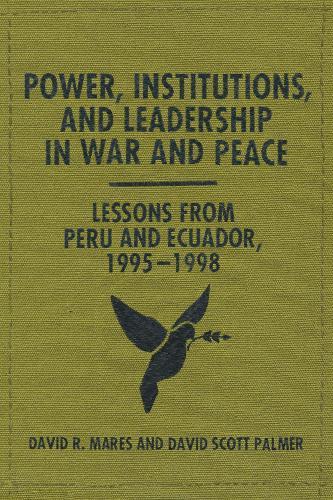Full Product Details
Author: David R. Mares ,
David Scott Palmer
Publisher: University of Texas Press
Imprint: University of Texas Press
Dimensions:
Width: 15.20cm
, Height: 1.30cm
, Length: 22.90cm
Weight: 0.227kg
ISBN: 9780292754294
ISBN 10: 0292754299
Pages: 200
Publication Date: 01 June 2012
Audience:
Professional and scholarly
,
Professional & Vocational
Format: Paperback
Publisher's Status: Active
Availability: In Print

This item will be ordered in for you from one of our suppliers. Upon receipt, we will promptly dispatch it out to you. For in store availability, please contact us.
Reviews
The analysis of developments during the years 1995 to 1998 is especially masterful, artfully weaving together the many different strands. The book also benefits from the provision of some good maps and helpful chronologies…Mares and Palmer have undoubtedly written the most comprehensive work possible on the Ecuador Peru territorial settlement pending the future opening of the diplomatic archives of the key players.--Philip Chrimes International Affairs
The analysis of developments during the years 1995 to 1998 is especially masterful, artfully weaving together the many different strands. The book also benefits from the provision of some good maps and helpful chronologies...Mares and Palmer have undoubtedly written the most comprehensive work possible on the Ecuador Peru territorial settlement pending the future opening of the diplomatic archives of the key players. * International Affairs *
The analysis of developments during the years 1995 to 1998 is especially masterful, artfully weaving together the many different strands. The book also benefits from the provision of some good maps and helpful chronologies...Mares and Palmer have undoubtedly written the most comprehensive work possible on the Ecuador Peru territorial settlement pending the future opening of the diplomatic archives of the key players.--Philip Chrimes International Affairs
Author Information
David R. Mares is Professor of Political Science at the University of California, San Diego, where he also serves as Institute of the Americas Chair for Inter-American Affairs and is Director of the Center for Iberian and Latin American Studies. His previous books include Drug Wars and Coffeehouses: The Political Economy of Drug Policy, Violent Peace: Militarized Interstate Bargaining in Latin America, and The United States and Chile: Coming in from the Cold with Francisco Rojas Aravena. David Scott Palmer is Professor of International Relations and of Political Science at Boston University, where he is also Founding Director of the Latin American Studies Program. His previous books include U.S. Relations with Latin America during the Clinton Years, Shining Path of Peru (ed.), and Peru: The Authoritarian Tradition.




